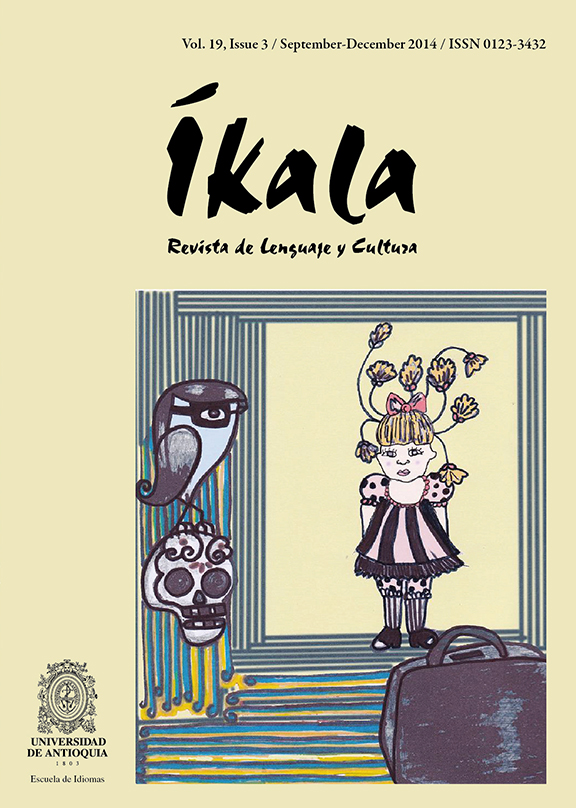El Uso de Juegos Dramáticos y Dibujos para Explorar las Representaciones Sociales de los Niños y las Niñas Acerca del Aprendizaje y la Enseñanza del Inglés
DOI:
https://doi.org/10.17533/udea.ikala.v19n3a06Palabras clave:
aprendizaje y enseñanza de lenguas extranjeras, dibujos, educación básica primaria, juego dramático, niños y niñas, representaciones socialesResumen
Este artículo está basado en el proyecto de investigación ''La mirada de los niños y las niñas sobre la enseñanza y el aprendizaje del inglés'' en el cual exploramos las representaciones sociales que ellos tienen sobre estas temáticas. Primero, explicamos cuáles fueron los motivos que nos llevaron a realizar esta investigación, así como los instrumentos de recolección de datos (dibujos y juegos dramáticos) y los procesos de análisis que utilizamos. Luego, presentamos nuestros aprendizajes en relación con aspectos metodológicos de la investigación y sobre las representaciones sociales. Finalmente, concluimos que la investigación con y para los niños y las niñas implica el diseño y la implementación de instrumentos de recolección de datos acordes con sus características. Consideramos que las políticas educativas podrían enriquecerse a partir de este tipo de investigación porque las voces de los niños y las niñas nos permiten identificar sus visiones acerca del ámbito educativo en el que ellos se encuentran.
Descargas
Citas
Albers, P., Frederick, T., Cowan, K. (2009). Features of gender: An analysis of the visual texts of third grade children. Journal of Early Childhood Literacy. 9, 234-260.
Araya, S. (2002). Las Representaciones Sociales: ejes teóricos para su discusión. Cuadernos de ciencias Sociales 127. Facultad Latinoamericana de Ciencias Sociales, FLACSO.
Cohen, L. y Manion, L (1994). Research Methods in Education. Inglaterra: Routledge.
Creswell, J. (1997). Qualitative Inquiry and Research Design: Choosing among Five Traditions. Capítulo 4: Five qualitative traditions of inquiry y Appendix A: An annotated glossary of terms. USA: Sage Publications.
Creswell, J. (2007). Qualitative Inquiry & Research Design: Choosing Among Five Approaches. USA: Sage Publications.
De Guzman, J. & Montiel, C. (2012). Social Representations of Foreign Aid: Exploring Meaning-Making in Aid Practice in Sulu, Southern Philippines. Journal of Pacific RIM Psychology, 6(1), 1-17.
Elcheroth, E., Doise, W. & Reicher, S. (2011). On the Knowledge of Politics and the Politics of Knowledge: How a Social Representations Approach Helps Us Rethink the Subject of Political Psychology. Political Psychology, 32(5), 729-728.
Fargas-Malet, M., McSherry, D., Larkin, E. & Robinson,
C. (2010). Research with children: methodological issues and innovative techniques. Journal of Early Childhood Research, 8(2), 175-192.
Gaitán, L. (2006). La nueva sociología de la infancia. Aportaciones de una mirada distinta. Política y Sociedad. 43(1), 9-26.
Moscovici, S. (1961). Le Psychanalyse, son image et son public. Paris: PUF.
Patton, M. (1990). Qualitative Evaluation and Research Methods. Newbury Park, CA: SAGE Publications, Inc.
Pinnegar, S. y Daynes,G. (2007). Locating narrative inquiry historically: thematics in the turn to narrative. Handbook of narrative inquiry:mapping a methodology. Thousand Oaks, California: SAGE Publications.
Rodríguez Sabiote, C. et al. (2006). La triangulación analítica como recurso para la validación de estudios de encuesta recurrentes e investigaciones de réplica en Educación Superior. RELIEVE, 12(2). http://www.uv.es/RELIEVE/v12n2/RELIEVEv12n2_6.htm
Salinas, M., Isaza, L., Parra Mosquera, C. (2006). Las representaciones sociales sobre la evaluación de los aprendizajes. Revista Educación y Pedagogía, 18 (46). 205-221.
Sandoval Casilimas, C. (1996). Investigación Cualitativa. Colombia: Instituto Colombiano para el Fomento de la Educación Superior.
Sierra, Z. (1998). Que tú eras una tortuga y que yo era un diablo: Aproximaciones al estudio del juego dramático en la edad escolar. Bogota: Universidad de Antioquia.
Wachelke, J. (2013). Beyond Social Representations: the Conceptual Bases of the Structural Approach on Social Thinking. Interamerican Journal of Psychology, 47(1), 131-138.
Descargas
Archivos adicionales
Publicado
Cómo citar
Número
Sección
Licencia
Derechos de autor 2014 Íkala

Esta obra está bajo una licencia internacional Creative Commons Atribución-NoComercial-CompartirIgual 4.0.












